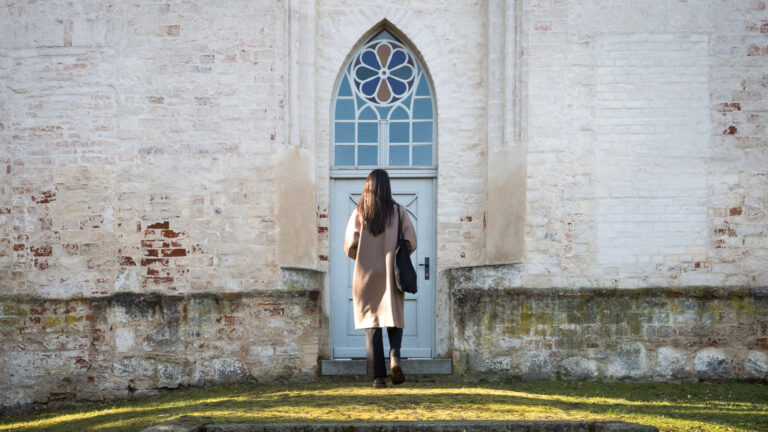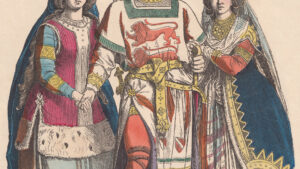I grew up playing with Barbie. Like many women reading this, I had scores of them, as well as the Barbie Dreamhouse, the convertible, the swimming pool, and one Ken doll (Mattel sells seven Barbies for every one Ken). Generations of us gathered in each other’s bedrooms to create stories for our Barbies and act them out. We changed their clothes a lot and made-believe the good life for our plastic collections. Through them, we imagined our own futures. Barbie served the aspirational purpose that her creator, Ruth Handler, envisioned for girls.
But as we came of age, our relationship with Barbie grew increasingly distant and even cold. At first, it was just that we outgrew pretend doll play. But then we became preteens and teens and—parallel to what the Barbies in Greta Gerwig’s Barbie movie experience—we emerged from our playtime paradise where everything was made according to our own ideals and dreams. We had to face the real world.
We gained unpleasant knowledge. Our eyes were opened. Barbie’s aspirational qualities were countered by something sinister. As the moody teen Sasha (Ariana Greenblatt) says to Barbie (Margot Robbie) when she first meets her, “You’ve been making women feel bad about themselves since you were invented. . . . You destroy girls’ innate sense of worth.”
Sizing Up Barbie
Are Barbie dolls good or bad? This is one of many philosophical questions the new film asks. And while you may assume audiences don’t want to think about weighty questions in a Barbie movie, consider that Barbie had the highest-earning opening weekend for all films so far in 2023, as well as the highest-earning one ever for a female-directed film. Greta Gerwig (Lady Bird and Little Women) has clearly struck a chord, fueling immense social media chatter and launching countless hot takes.
In the movie, newfound knowledge requires Barbie to leave Barbieland for the Real World. Ken (Ryan Gosling) joins her but returns early to establish the Kendom while she’s still away. The result is a power struggle between the two genders as all the Barbies and Kens try to determine their purpose and place in the world. The film may have a minor plot, but it asks major questions. Barbie is creating plenty of community and controversy, both online and in real life. It’s forcing a conversation that’s relevant for the church—but I’m not sure we’re ready to have it.
It’s Complicated
The answer to the question of whether Barbie dolls are good or bad is this: it’s complicated. The same is true of the movie and all the themes it brings to the surface. Gerwig is unwilling to present obvious conclusions throughout, highlighting the complex ways men and women relate to themselves and to one another in this cultural moment.
Gerwig’s refusal to be simply “pro” or “con” is the film’s greatest strength (other than, admittedly, Ryan Gosling’s over-the-top hilarious performance as Beach Ken). Consider just a few of the major topics Gerwig’s film explores.
Barbie is forcing a conversation that’s relevant for the church.
Feminism
Barbie, herself an icon for feminism, was created in the 1950s so little girls might imagine their own grown-up lives when they play with Author Barbie, Doctor Barbie, Physicist Barbie, and more. The movie, though, causes the audience to ask, “Is feminism good or bad?” It doesn’t offer a neat and tidy answer. The film seems to say that if feminism helps little girls grow up to be all they can be and fulfill a diversity of roles, it’s good. But if feminism says men aren’t needed, it’s bad. As with all tough topics in the movie, it’s multilayered.
Motherhood
Some viewers have claimed the film is antimotherhood. There may be some truth in that claim. Pregnant Barbie is sidelined and called weird. The opening scene doesn’t want little girls to envision themselves as only the mothers of babies.
On the other hand, the human mother-daughter relationship (America Ferrera and Ariana Greenblatt) develops sweetly. Most mothers and daughters can see themselves, at least a little bit, in their dynamic. And the way they come together to cheer for one another and all women is good. There’s a photo montage near the end of the film that brings many viewers to tears. It conveys the message “Growing up as a girl is hard, but it’s very good.” Many walk away from the movie appreciating motherhood even more. Barbie’s maker says to her, “We mothers stand still so that our daughters can look back and see how far they’ve come.”
Patriarchy
One of the most polarizing aspects of Barbie is its portrayal of men. It’s true, there are no genuinely good or smart male characters present (except maybe Allan). As with the toys, Ken is an accessory to Barbie. The Kens in the movie portray what it’s like to be identifiable only by one’s connection to another person.
But to say the film is bad because it makes men look bad is to miss the point of Ken and his Kendom altogether. Gerwig wants us to consider what it’s like to live in another’s shadow, something many women regularly feel—even in 2023. It would be simplistic to say the Barbie movie disses the patriarchy and exalts the matriarchy. It’s clear in the movie that neither is good for anyone.
There are a dozen more themes worthy of dissection, and absolute proclamations about any of them short-circuit the film’s invitation to reflect on these issues from multiple angles. Prematurely proclaiming “It’s good!” or “It’s bad!” shuts down important conversations about identity and gender and how men and women can live in harmony and even advocate for each other. These conversations are certainly needed in culture. As Christians, we should admit they’re also needed in the church.
Why ‘Barbie’ Matters for the Church
Of the 40 million people who’ve stopped going to church over the last 25 years, 10 percent say they left specifically because of misogyny. More than one leading Christian denomination in the U.S. is currently embroiled in a scandal of widespread sexism and sexual abuse. Anecdotally, women in ministry across the nation will tell you they struggle to know how to function in the church because they’ve been discipled (inadvertently or not) to see themselves as threats, temptresses, or less than their male counterparts. We feel at once too much and not enough. (It may be therapeutic for one of us to write and share a replica of America Ferrera’s fiery monologue but for women in ministry.)
The Barbie movie invites a conversation about our identities both as individuals and as men and women together. We Christians have the tools to engage this conversation, both inside the church and out there in the world, but will we? Are we willing to think deeply, listen patiently, and share honestly?
There’s a significant thread throughout the Barbie movie that ponders creation and Creator, the relationship between Adam and Eve, and the question of all questions: What are we made for? Spiritual and anthropological questions abound in the film, but answers are hard to come by.
Perhaps it’s a testament to our “all over the place” cultural confusion on these topics that Barbie has sparked such a multitude of (sometimes contradictory) interpretations. In a culture grappling for solid handles to approach the slippery questions of identity, it’s no wonder the meaning of Barbie—like the toys we used to play make-believe with—is essentially whatever the viewer wants it to be. Without God and Scripture guiding the way, questions of human identity (including gender) and purpose default to subjectivity.
But whereas the movie falls short in giving clear answers to massive questions about life and gender, Christians should not. We know the God who made us and died to save us. We know what humans are made for. We know both men and women are very good and both men and women need each other. We have God’s Spirit and God’s Word to enable us to be on mission together.
Whereas the movie falls short in answering massive questions about life and gender, we should not.
Rather than slipping into the sex segregation and suspicion that comes so easily in the flesh, let’s stand side by side, eager to honor and advocate for one another. Let’s resist church versions of Barbieland and Kendom, where men and women are pitted against each other. Let’s resist too-fast and too-easy answers to complicated questions. Let’s listen to one another. Let’s behave as the siblings we’re meant to be.
Try Before You Buy: FREE Sample of TGC’s New Advent Devotional

Choosing the right Advent daily devotional can be tough when there are so many options. We want to make it easier for you by giving you a FREE sample of TGC’s brand-new Advent devotional today.
Unto Us is designed to help you ponder the many meanings of this season. Written by TGC staff, it offers daily Scripture readings, reflections, and questions to ponder. We’ll send you a free sample of the first five days so you can try it out before purchasing it for yourself or your church.

































